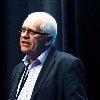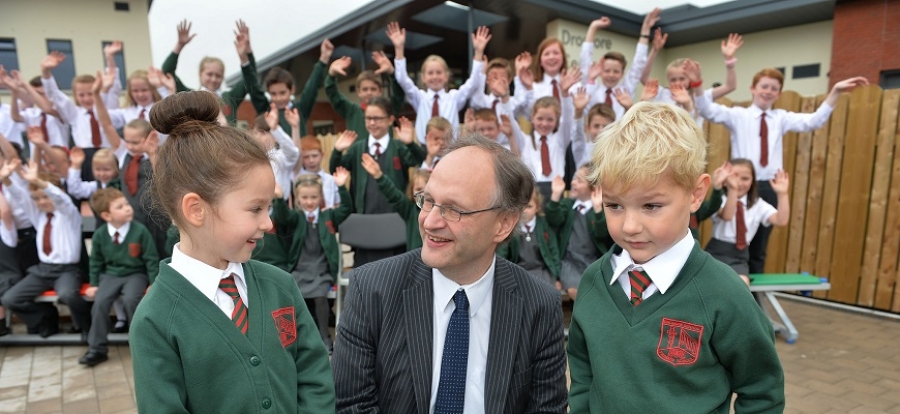As a class teacher, I would have to consider the areas that I wanted to focus on, as well as those identified by others. The ‘others’ could include headteachers, the local authority, government and their agencies, and sometimes HMIE (Her Majesty's Inspectorate of Education). I remember feeling, like many teachers, that I was overloaded by what other people were telling me I should be focusing on, before I even began to address my own priorities.
As a younger teacher, it is difficult to reconcile all these competing agendas and demands for your time and attention, as you grapple with the learning and teaching demands of your class or subject. This can lead to increasing stress levels, as you feel unable to control all of the demands, as well as lots of busyness with little sustainable impact for learners. Very quickly, you end up spending a little time on everything, rather than enough time on something.
I recognised that continuing to work in such ways was a recipe for failure, both for schools and, most importantly, for learners. With this in mind, I started to ‘exploit policy’, as Michael Fullan “Concentrate all your efforts in supporting teachers to develop their expertise.”has called it, and began to seek connections between all that I had to do. It was here that I was able to begin to make sense of all these competing demands, and begin to deal with them in a managed and measured way, which protected my own wellbeing, and in turn had positive impacts for learners and my practice. I began to determine that if I could not connect up aspects of competing agendas, then I had to prioritise, always putting learning and teaching in my own particular context first. This kept development proportionate and manageable, and more left me able to support learners and meet the needs of the school I was in.
By the time I became a headteacher, I had already begun to formulate a way of working that allowed me to assess and sort all that had to be done. This method allowed me to plan my work in a way that was connected and reasonable for both my staff and myself. As a headteacher, you still have all the demands and agendas that class teachers face - probably more. However, I always saw the protection of staff as a major part of my responsibilities. This meant defending them from the incessant demands of ‘others’, and also their own desire to do everything and try to please everyone, at a cost to them and ultimately their learners. I got very good at reducing School Improvement Plans, making them increasingly more realistic documents. These became living actions, focused on our own context, not written to satisfy the expectations of others. In doing so, we slowed down, achieved more and began to embed and sustain changes we made.
The biggest impacts, when we gained most control of each year ahead, occurred when we changed completely our approach to professional development, and school development. There was a time when these were considered as separate entities, but it is when you recognise the obvious inter-connectedness of them that you really begin to unleash the power of both, for the benefit of all.
That teachers are the most important school factor in pupil achievement has been recognised by researchers and school leaders for many years. Look to Hattie, Wiliam, Hargreaves, Fullan, Harris, Timperley, Stenhouse, Dewey and many more. They all point to the primacy of teacher effectiveness in improving outcomes for learners, above all other school factors. If this is the case, my suggestion to school leaders would be to concentrate all your efforts in supporting teachers to develop their expertise, as well as their understanding of the impact they are having on learning in their classrooms, and for teachers to do the same.
To do this, individual teachers and school leaders may have to change attitudes and approaches towards professional development and school development.
Teachers need to recognise that professional development and growth has to become a career-long disposition. It creates a coherent, continual process of reflection, collaboration and improved practice, grounded in personal and professional contexts, which is measured in improved outcomes for learners.
School leaders need to recognise this too. They must be be able to support their teachers to develop, which means creating learning cultures which allow teachers the space, time and trust to take risks, innovate and importantly use research to inform their practice. They also need to see themselves as learners, applying the same principles to their own practice and development. In doing so, they support the continual development and improved impact of all their teachers, creating a culture that supports the same across the whole school.
Both teachers and school leaders need to see professional development as something done by them, not to them. Professional development is not a series of events, or the attendance at a conference or course, though these can play a role, if they are part of a self-identified process of personal and school growth.
Ultimately, we should seek to develop self-improving teachers and schools, where development is grounded in their particular context and identified needs, and which promotes teacher agency and professional dispositions. If we want to develop adaptive expertise and teacher agency in our schools and systems, we need to create cultures that allow such qualities to flourish, and have to abandon those that seek to impose command and control measures, and associated micro-management, on those who have the greatest influence on our learners and school development.
From my own experience as a Scottish school leader for almost twenty years, the vehicle with greatest impact I found to facilitate the development of such dispositions and cultures was through practitioner enquiry. Practitioner enquiry emerged out of the work of Lawrence Stenhouse and others, who identified the power that lay in teachers becoming researchers into their own practice and how they were impacting on learning. Stenhouse used the Action Research model to develop teachers as enquiring professionals, looking closely at aspects of their practice, using data and research to help themselves identify the improvements they could make and assess impact.
Practitioner enquiry is an extension of such approaches. It gives teachers a systematic way of looking closely at what they do and the impacts they are having on the learning of their learners. Key to the approach is that it is not another ‘thing’ to do. Instead, it should “We need to create cultures that allow teacher agency to flourish.”develop as a disposition and a ‘way of being’ for professional educators, one that helps them to improve their practice for the learners in front of them, and in their particular context. It is an ongoing reflection on, and adjustment of, practice, based on evidence and research. It situates professional learning in each teacher’s classroom and practice in a connected and coherent way, developing teachers with ‘inquiry as stance’, as Marilyn Cochran-Smith and Susan Lytle have described it.
Benefits from such an approach include:
- Improved attainment and achievement for all learners, continually developing teacher agency and adaptive expertise.
- Improved school performance.
- Practice informed by research.
- Protection from the ‘fads and trends’ of educational marketing and commerce.
- Protection from the slowing down of development and change to promote deep, sustainable, collaborative learning cultures, as well as connections made visible between all the essential elements of school and professional development.
If, in the first few weeks of the new school year, you can identify that by the end of it you will have taken steps to develop such practices and cultures, and that these can become embedded in your school and your practice, then perhaps this really can be your year. The year when you stopped feeling swamped by all the imposed busyness of schools, with little regard to impact. The year you embrace a different way of being, one that allows you to develop as self-improving teachers and schools, with consequent improvements for all your learners.
“A journey of a thousand miles begins with a single step,” said Lao Tzu, the Chinese philosopher. With this in mind, why not let your first step happen this year, when you decide to regain control of your own personal and professional development, in order to better meet the learning needs of all your learners, including yourself?
If this is not your year, it will remain someone else’s.
Some further reading around this:
- Cochran-Smith, M. and Lytle, S. (2009) Inquiry As Stance. New York: Teachers College Press
- Darling-Hammond, L. and Bransford, J. (2007) Preparing Teachers for a Changing World: What Teachers Should Learn and Be Able to Do. San Francisco:Jossey-Bass
- Stenhouse, L. (1975) An Introduction to Curriculum Research and Development. London: Heinemann
- Timperley, H. (2011) Realizing the Power of Professional Learning. Maidenhead: Open University Press
- Wiliam, D. (2015) Changing What Teachers Do Is More Important Than Changing What They Know. Blog post on Dylan Wilam’s Learning Sciences website (March 2015).
Want to receive cutting-edge insights from leading educators each week? Sign up to our Community Update and be part of the action!


















